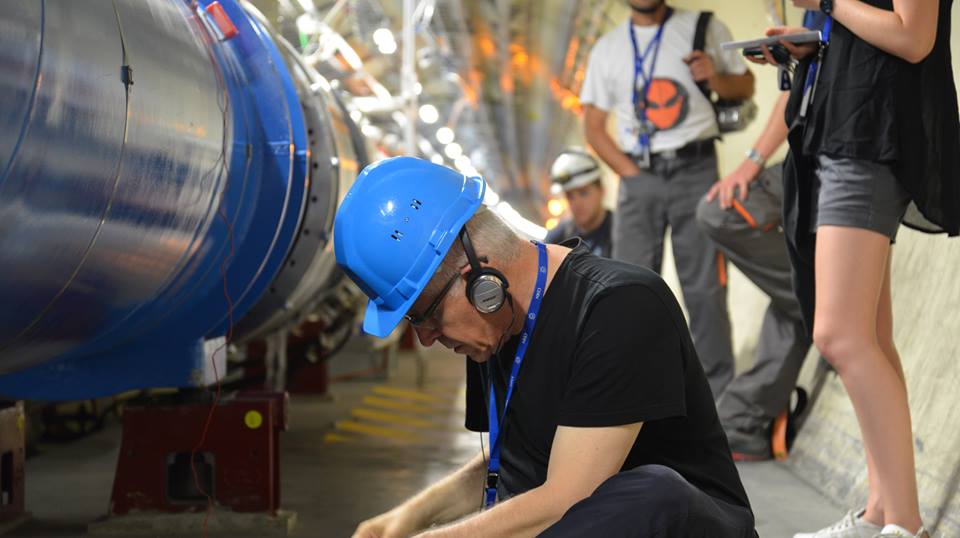Composer and sound artist John Cage once wrote in History of Experimental Music in the United States:
“Why, if everything is possible, do we concern ourselves with history (in other words with a sense of what is necessary to be done at a particular time?” And I would answer, “In order to thicken the plot.”
Cage’s engagement with the history of music enabled him to think critically and intellectually about how to push the boundaries of music. For example, he pioneered a compositional approach called indeterminacy, in which the musician “reading” the music can interpret and perform the original written piece in an infinite number of ways. Cage’s approach is built upon a prior knowledge of other avant-garde artists, such as Edgard Varese.
It was Varese, who in 1936, imagined sound and new music beyond the boundaries of music as it was understood. He wrote in The Liberation of Sound:
“From Perspectives on New Music New Instruments and New Music When new instruments will allow me to write music as I conceive it, taking the place of the linear counterpoint, the movement of sound-masses, of shifting planes, will be clearly perceived… There will no longer be the old conception of melody or interplay of melodies. The entire work will be a melodic totality. The entire work will flow as a river flows.”
Varese was describing a type of music that was not defined by notes or traditional rhythms.
As a student who has not had any exposure to the history of experimental music, I find Cage’s reasoning for studying the history of music to be continually relevant in my approach to experimental music. In today’s age where nearly any form of digital art is accessible within a click, context is often lost. I have heard experimental music before, but I didn’t have a particular appreciation for it. But understanding why and how Cage and Varese were trying to break away from the traditions of sound and composition has given me a greater appreciation and sense of intent, especially with using programs such as Max, where I have yet to use a conventional piano keyboard, a sheet of music, or even a grid that would be commonly found in many digital application. Sound has indeed been liberated according to the vision of Varese.
Prior to concerning myself with the history of experimental music, sound was simply just noise without a context. But even sound itself, does not need to be defined as something inherently musical. Learning about sound artists such as Bill Fontana and Janet Cardiff has expanded my understanding of how sound can and could be used.
In an interview with Peter Traub from Networked Music Review Fontana described:
Besides the physical differences between sound in the air and vibrations in solids and underwater, most people find their everyday acoustic worlds hidden by lack of attention, and iTunes. I wish to bring these hidden aspects to the foreground.
Fontana wants people to appreciate sounds as they are found in the natural environments. He believes that sound has taken a secondary role to music. Understanding Fontana’s work has evoked me to take the time to simply listen to the sounds in my surroundings and to think about them or think about how they could be employed.
Cardiff’s use of sound in her audio walks has challenged me to think about how sounds could be employed. She describes her work:
…the sound of my footsteps, traffic, birds, and miscellaneous sound effects that have been pre-recorded on the same site as they are being heard. This is the important part of the recording. The virtual recorded soundscape has to mimic the real physical one in order to create a new world as a seamless combination of the two.
Learning from Cardiff’s work has taught me to think about sound as a virtual experience. As something that can transport a listener to a different place or time.
While I’m still an early student of experimental music, concerning myself with the history experimental music, past and present, has certainly “thickened the plot.” Whether it’s exploring music beyond the conventional notion of music or employing sound to impact the listener in a particular manner, sounds and the creation of sounds are not just arbitrary, but are done with intent.


You are right, John Cage certainly thickened the plot, in terms of understanding the nature of sound and how our ears could be expanded to allow for and appreciate new sonic experiences. It is a complex idea and the plot is really about the resistance we have against the acceptance of new ideas and in Cage’s work, sound. You built a very strong case for how Cage and Varese have influenced the evolution of contemporary music. And yes, we would not have the broad use of noise and sound in more recent music, as well as film, games, etc., were it not for the liberation of sound that they introduced.
I was also very impressed by your reference to the use of Max, how without a score, a keyboard, or a grid, you were able to produce very interesting music and images.
I would have liked to have seen you reference, specifically, a few of the works that were created by Cage, Varese, Fontana, and Cardiff that would have supported your very strong ideas. This, in addition to discussing how these works and ideas influenced your own composition would have also strengthened the essay.
That said, I thought your writing was eloquent and thoughtful, just lacking in specific references.